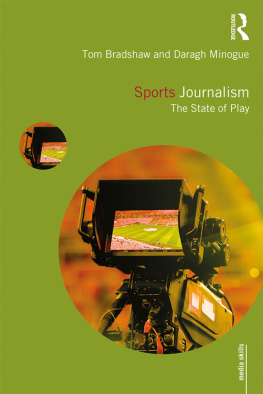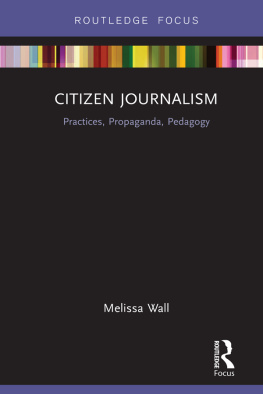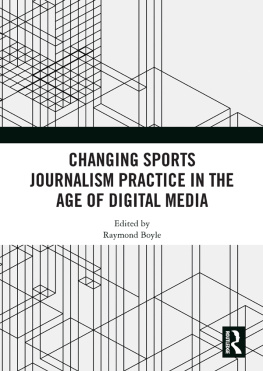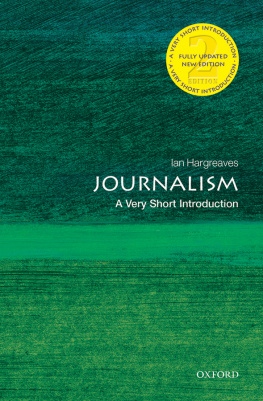The Future of Journalism: In an Age of Digital Media and Economic Uncertainty
The development of digital media has delivered innovations and prompted tectonic shifts in all aspects of journalism practice, the journalism industry and scholarly research in the field of journalism studies; this book offers detailed accounts of changes in all three arenas. The collapse of the advertising model, in tandem with the impact of the continuing global recession, has created economic difficulties for legacy media, and an increasingly frenzied search for new business strategies to resource a sustainable journalism, while triggering concerns about the very future of journalism and journalists. The Future of Journalism: In an Age of Digital Media and Economic Uncertainty brings together the research conversation conducted by a distinguished group of scholars, researchers, journalists and journalism educators from around the globe and hosted by The Future of Journalism at Cardiff University in September 2013. The significance of their responses to these pressing and challenging questions is impossible to overstate. Divided into nine sections, this collection analyses and discusses the future of journalism in relation to: Revenues and Business Models; Controversies and Debates; Changing Journalism Practice; Social Media; Photojournalism and visual images of News; Local and Hyperlocal journalism; Quality, Transparency and Accountability; and Changing Professional Roles and Identities. This book is essential reading for everyone interested in the prospects for journalism and the consequent implications for communications within and between local, national and international communities, for economic growth, the operation of democracy and the maintenance and development of the social and cultural life of societies around the globe.
This book was originally published as special issues of Digital Journalism, Journalism Practice and Journalism Studies.
Bob Franklin is Professor of Journalism Studies in the School of Journalism, Media and Cultural Studies at Cardiff University, UK. He is founding editor of the journals Digital Journalism, Journalism Practice, and Journalism Studies. Recent book length studies include: The Future of Journalism: Developments and Debates (2013); Televising Democracies (2013); Social Work, the Media and Public Relations (2013, with Nigel Parton); The Future of Journalism (2011); Journalism Education, Training and Employment (2011, with Donica Mensing); Journalism, Sources and Credibility: New Perspectives (2011, with Matt Carlson); and The Future of Newspapers (2009).
Journalism Studies: Theory and Practice
Series editor: Bob Franklin, Cardiff School of Journalism, Media and Cultural Studies, Cardiff University, UK
The journal Journalism Studies was established at the turn of the new millennium by Bob Franklin. It was launched in the context of a burgeoning interest in the scholarly study of journalism and an expansive global community of journalism scholars and researchers. The ambition was to provide a forum for the critical discussion and study of journalism as a subject of intellectual inquiry but also an arena of professional practice. Previously, the study of journalism in the UK and much of Europe was a fairly marginal branch of the larger disciplines of media, communication and cultural studies; only a handful of Universities offered degree programmes in the subject. Journalism Studies has flourished and succeeded in providing the intended public space for discussion of research on key issues within the field, to the point where in 2007 a sister journal, Journalism Practice, was launched to enable an enhanced focus on practice-based issues, as well as foregrounding studies of journalism education, training and professional concerns. Both journals are among the leading ranked journals within the field and publish six issues annually, in electronic and print formats. More recently, 2013 witnessed the launch of a further companion journal Digital Journalism to provide a site for scholarly discussion, analysis and responses to the wide ranging implications of digital technologies for the practice and study of journalism. From the outset, the publication of themed issues has been a commitment for all journals. Their purpose is first, to focus on highly significant or neglected areas of the field; second, to facilitate discussion and analysis of important and topical policy issues; and third, to offer readers an especially high quality and closely focused set of essays, analyses and discussions.
The Journalism Studies: Theory and Practice book series draws on a wide range of these themed issues from all journals and thereby extends the critical and public forum provided by them. The Editor of the journals works closely with guest editors to ensure that the books achieve relevance for readers and the highest standards of research rigour and academic excellence. The series makes a significant contribution to the field of journalism studies by inviting distinguished scholars, academics and journalism practitioners to discuss and debate the central concerns within the field. It also reaches a wider readership of scholars, students and practitioners across the social sciences, humanities and communication arts, encouraging them to engage critically with, but also to interrogate, the specialist scholarly studies of journalism which this series provides.
Available titles in the series:
Mapping the Magazine
Comparative Studies in Magazine Journalism
Edited by Tim Holmes
The Future of Newspapers
Edited by Bob Franklin
Language and Journalism
Edited by John Richardson
The Future of Journalism
Edited by Bob Franklin
Exploration in Global Media Ethics
Edited by Muhammad Ayish and Shakuntala Rao
Foreign Correspondence
Edited by John Maxwell Hamilton and Regina G. Lawrence
How Journalism Uses History
Edited by Martin Conboy
Lifestyle Journalism
Edited by Folker Hanusch
Environmental Journalism
Edited by Henrik Bdker and Irene Neverla
Online Reporting of Elections
Edited by Einar Thorsen
The Future of Journalism: Developments and Debates
Edited by Bob Franklin
Cross-continental Views on Journalistic Skills
Edited by Leen dHaenens, Michal Opgenhaffen and Maarten Corten
Cosmopolitanism and the New News Media
Edited by Lilie Chouliaraki and Bolette Blaagaard
The Press and Popular Culture in Interwar Europe
Edited by Sarah Newman and Matt Houlbrook
Community Journalism Midst Media Revolution
Edited by Sue Robinson
Digital Technologies and the Evolving African Newsroom
Towards an African Digital Journalism Epistemology
Edited by Hayes Mawindi Mabweazara
Making Sense of Mediatized Politics
Theoretical and Empirical Perspectives
Edited by Jesper Strmbck and Frank Esser
The Future of Journalism: In an Age of Digital Media and Economic Uncertainty
Edited by Bob Franklin






